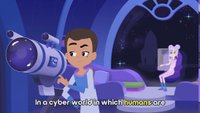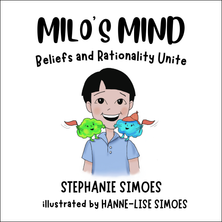Teach Your Kids Critical Thinking
Our interactive courses, worksheets, and lesson plans help kids develop the skills to communicate clearly, think logically, and make well-informed decisions.
Education Website
★★★★★I've been doing this myself as an adult and I find them easy to understand and entertaining. My eldest child, (8y.o.) started watching with me and said that...— Liliana for Fallacy Detectors
★★★★★This was so easy to comprehend for my child and was so engaging both us parents did it together with him. It took us by surprise how much he enjoyed it and how...— Jessica A. for Fallacy Detectors
★★★★★My 8 year old son LOVED [Fallacy Detectors] part 1 and had so much fun doing the quizzes! I also had a great time watching it and talking about it.— Megan, parent for Fallacy Detectors
★★★★★I learned about different types of fallacies which help me to identify them when having a conversation. I've been able to identify LOADS of circular reasoning!— Adèle, 9 for Fallacy Detectors
★★★★★The videos are great! They're fun, engaging, and in just a few days, my son is understanding logical fallacies so much better than he was before, after like a year of lessons!— Anonymous for Fallacy Detectors
★★★★★[My daughter] followed the entire Fallacy Detector Part 1 and immediately asked to do the other classes as well ... we had a very long discussion about what she learned over dinner.— Nino, parent for Fallacy Detectors
★★★★★These have been a great addition to our homeschool days. My teens and tween have really enjoyed trying to figure them out.— Arline for Printable Logic Puzzle Cards
★★★★★Critikid is an all-around great tool for children and teens who want to develop their analytical skills.— Ben, 15 for Fallacy Detectors
★★★★★I did this course to assess critical thinking content for kids, as I feel it is sorely lacking generally in school curricular and may be one of the reasons for...— Dr Amy for Fallacy Detectors
★★★★★I am a university teacher and I am trained in statistics...and my score was not perfect :) I loved the course, learned from it, and am recommending it to...— Kiron for A Statistical Odyssey
★★★★★What a fun way to learn statistics!— Denali for A Statistical Odyssey
★★★★★It was a cool little text adventure game. Perhaps it would benefit from some kind of branching in the story that would lead to dead ends or some humorous...— Krzyftosz for A Statistical Odyssey
★★★★★I'm a college student and am interested in using these resources in k-12 classrooms, but decided to give it a try myself first, and it was great! Even my...— Theo Dawson for A Statistical Odyssey
★★★★★I am exploring critical learning techniques for young students and am curious about the structure used.....seems consistency in delivery is...— Clinton Laird for Fallacy Detectors
★★★★★I've tried emotional intelligence course with my son. We made in 2 days, I liked it, it is not a solution but more like a path to discovery how to identify and control emotions. I recall it several time when my son loose his temper.— Gleb for Emotional Intelligence
★★★★★I always like doing math and puzzles, but The Fallacy Detectors was extra fun. And I spotted a fallacy in a book the other day!— Tessa, 9 for Fallacy Detectors
★★★★★Fallacy Detectors has provided so much clarity for my child; he's had the best time running around using his newfound understanding of logical fallacies.— Tiffany F. for Fallacy Detectors
★★★★★[Logic for Teens] was a more fun and relaxed introduction to logic than I had with truth tables. The final quizzes were probably my favourite bit, because it...— Aylin, 17 for Logic for Teens
★★★★★[My granddaughter] was very invested in getting all the answers correct. I think that the most interesting part was the stories of the children feeling...— Elaine F. for Emotional Intelligence
★★★★★I'm working though the pages with my grade 5 class and they are having a great time trying to figure out the problems and logical fallacies in the posts. I...— Paul V. for Social Media Simulator
★★★★★I love this. You've gamified critical thinking in a way that's not just smart, it's essential. If we're going to raise a generation capable of surviving...— John Furr for Social Media Simulator
★★★★★Over two nights, [my sons and I] went through 8 lessons, and they loved it. They are 16 and 17, so they were more likely to hit on the right answers, but they...— Rifki for Social Media Simulator
★★★★★I loved it i think everyone should do this— Advit Malhotra for Emotional Intelligence

Fallacy Detectors
Develop the skills to tackle logical fallacies through a series of 10 science-fiction videos with activities. Recommended for ages 8 and up.

Social Media Simulator
Teach your kids to spot misinformation and manipulation in a safe and controlled environment before they face the real thing. Recommended for ages 9 and up.

A Statistical Odyssey
Learn about common mistakes in data analysis with an interactive space adventure. Recommended for ages 12 and up.

Logic for Teens
Learn how to make sense of complicated arguments with 14 video lessons and activities. Recommended for ages 13 and up.

Emotional Intelligence
Learn to recognize, understand, and manage your emotions. Designed by child psychologist Ronald Crouch, Ph.D. Recommended for ages 5 to 7.
Worksheets & Lesson Plans

Logical Fallacies Worksheets and Lesson Plans
Ages 8–12Teach your grades 3-7 students about ten common logical fallacies with these engaging and easy-to-use lesson plans and worksheets.

Symbolic Logic Worksheets
Ages 13+Worksheets covering the basics of symbolic logic for children ages 13 and up.

Elementary School Worksheets and Lesson Plans
Ages 7–10These lesson plans and worksheets teach students in grades 2-5 about superstitions, different perspectives, facts and opinions, the false dilemma fallacy, and probability.

Middle School Worksheets and Lesson Plans
Ages 10–13These lesson plans and worksheets teach students in grades 5-8 about false memories, confirmation bias, Occam’s razor, the strawman fallacy, and pareidolia.

High School Worksheets and Lesson Plans
Ages 13+These lesson plans and worksheets teach students in grades 8-12 about critical thinking, the appeal to nature fallacy, correlation versus causation, the placebo effect, and weasel words.

Statistical Shenanigans Worksheets and Lesson Plans
Ages 13+These lesson plans and worksheets teach students in grades 9 and up the statistical principles they need to analyze data rationally.

Printable Logical Fallacy Handbook
Ages 13+A printable PDF explaining 20 common logical fallacies with real-world examples. Recommended for teens and adults.
Printable Logic Puzzle Cards
Ages 10+Printable logic puzzle cards with answers and explanations. Varied levels mean they will challenge kids, teens, and even adults.

Printable Data Analysis Handbook
Ages 13+A printable PDF explaining 8 common errors in data analysis with real-world examples. Recommended for teens and adults.
The Language of Science: Facts, Laws, and Theories
Ages 11+This free science literacy worksheet teaches the difference between facts, laws, and theories and addresses common misconceptions. Recommended for grade 6 and up.
Printable Formal Fallacy Handbook
Ages 13+A printable PDF explaining 6 formal fallacies with examples. Recommended for teens and adults.
Critical Thinking Bundles
Critical Thinking for the Digital Age
Ages 13–18Includes 5 items: Homeschool Curriculum, Social Media Simulator, A Statistical Odyssey, Logic for Teens, Symbolic Logic Worksheets.




Logical Fallacies Teachers' Bundle
Ages 8–12Includes 3 items: Fallacy Detectors, Logical Fallacies Worksheets and Lesson Plans, Printable Logical Fallacy Handbook.



Teen Bundle
Ages 13+Includes 6 items: A Statistical Odyssey, Logic for Teens, Symbolic Logic Worksheets, High School Worksheets and Lesson Plans, Statistical Shenanigans Worksheets and Lesson Plans, Printable Logical Fallacy Handbook.






Logic Bundle
Ages 13+Includes 2 items: Logic for Teens, Symbolic Logic Worksheets.


Kids Bundle
Ages 8–12Includes 5 items: Fallacy Detectors, Social Media Simulator, Logical Fallacies Worksheets and Lesson Plans, Elementary School Worksheets and Lesson Plans, Middle School Worksheets and Lesson Plans.






Milo's Mind - The Book
Milo’s mind is full of BELIEFS—but not all of them are true. Luckily, he has a helpful guide: RATIONALITY, a detective who helps him ask questions and search for evidence.
In this picture book for kids ages 6-9, young readers will discover how critical thinking, curiosity, and the courage to rethink what you believe can turn you into a real-life superhero.
Critikid’s Story
My name is Stephanie Simoes. While teaching kids facts helps protect them from being misled, we can't teach facts fast enough to combat the constant stream of misinformation they face. I believe children need to develop critical thinking tools to rationally evaluate the claims they encounter every day and to notice how their biases shape their understanding of them.
I started teaching critical thinking to my students and learned that kids not only understood the topics—they loved learning about them! I struggled to find critical thinking resources to help me, so I decided to made my own. That’s why I started Critikid. This is a small, bootstrapped family project.
Critikid’s Mission
Critikid's goal is to give kids and teens the skills they need to rationally think about and discuss controversial issues without telling them the conclusions they should draw. Critikid's resources teach kids how to think, not what to think.
Read more about Critikid.
What is critical thinking?
Critical thinking is slow, careful thinking. It is the process of pausing to question our assumptions, check our biases, and weigh evidence before accepting a claim or making a decision. It helps us rationally analyze information, arguments, and even our own thought processes.
What are the building blocks of critical thinking?
The following skills help people of all ages to think critically:
Recognizing logical fallacies – Logical fallacies are common reasoning errors that weaken arguments. Learning to recognize them—both in other people’s words and in our own thoughts—keeps discussions productive and clear.
Information, data, and science literacy – Facts and figures can be presented in misleading ways. Knowing how to analyze data guards us against incomplete truths.
Intellectual humility – Acknowledging that we don't know everything and that we might be wrong opens the door to learning and healthy skepticism.
Emotional intelligence – Being able to understand and manage our feelings helps us think more clearly when stakes (or tempers) are high.
Why is critical thinking important?
Critical thinking helps us to:
Communicate clearly: Logical fallacies can derail conversation. When we can identify and respond to them, we can steer conversations back on track.
Make better decisions: Critical thinking helps us recognize when our biases and assumptions are impacting our decision-making. By slowing down, we can better judge risks and rewards, compare short‑ and long‑term consequences, and choose the path that will help us reach our goals.
Defend ourselves against manipulation: Advertisers, scammers, and influencers can exploit people's biases and use logical fallacies to persuade people to buy things or accept ideas. Critical thinking makes their tricks easier to spot and ignore.
Why teach kids critical thinking to kids?
Our brains love shortcuts. Left on autopilot, we tend to accept the first explanation that feels intuitively right. Slow, careful thinking is not our default—it’s a skill that takes practice, just like reading or riding a bike. That’s why kids need explicit lessons in critical thinking.
This applies to people of all ages, but starting early is best because it:
Builds good habits before bad ones set in – It’s easier to learn pause and question now than to unlearn snap-judgments later.
Turns kids' natural curiosity into competence – Kids already ask “why.” Critical thinking education shows them how to test explanations, not just collect them.
Normalizes intellectual humility – Kids should grow up knowing that not having all the answers is normal and changing your mind when you get new evidence is a strength.
At what age should kids start learning critical thinking?
Children can do activities to develop their critical thinking skills even before they can talk. A toy that lights up when a button is pressed teaches cause and effect, peek-a-boo teaches object permanence, and nesting toys help develop problem-solving skills. Once kids can talk, they can start to do simple experiments. For example, you can ask, “What do you think will happen when you mix the red and yellow paint?” The child can make a hypothesis and test it by mixing the paints.
For more practical ideas on how to teach critical thinking at home, read Critical Thinking for Kids.
Critikid currently offers critical thinking courses for kids ages 5 and up:
- 5-8: Emotional Intelligence
- 8-12: Fallacy Detectors
- 9+: Social Media Simulator
- 12+: A Statistical Odyssey
- 13+: Symbolic Logic for Teens
What's next

Fallacy Detectors Part 2
Coming soon! - The fallacy-busting quest continues with 10 more fallacies to defeat.

Cognitive Biases
Coming Soon - Discover the sneaky tricks your brain plays on you and become a better decision-maker.

Media Literacy
Coming Soon - Learn to navigate the online world safely and rationally.